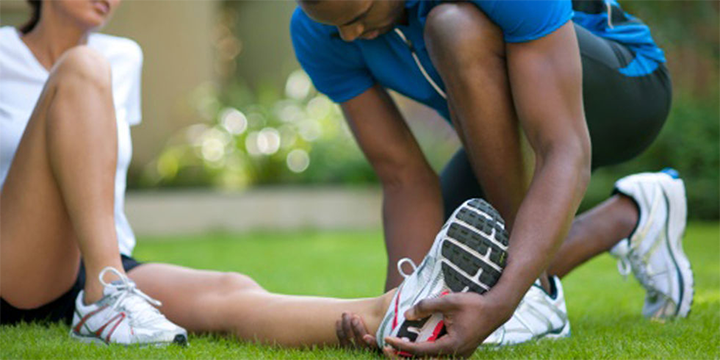The image of an international footballer crumbling to the ground, clutching his knee and crying out in pain is a common sight we witness. It is a staunch reminder that injuries can happen at any time. Mostly, when you least expect it. It can end an athlete’s season and, from what some doctors have said, may alter his career. For those of us living an active and/or athletic lifestyle, it could happen to anyone—but most of us don’t have a team of expert therapists to help us get back in shape.
Any time you venture out into the field, no matter what the sport or exercise and regardless of location, one is always at the risk of injury. Sports injuries are commonly caused due to excess, direct impact, or the application of force that is greater than the body part can structurally endure. There are two kinds of sports injuries: acute and chronic. A damage that occurs suddenly, such as a sprained ankle caused by an uncomfortable landing, is known as an acute injury. Chronic injuries are caused by recurring overuse of muscle groups or joints. Poor technique and structural abnormalities can also contribute to the development of chronic injuries. Medical investigation of any sports injury is important, because you may be hurt more severely than you think. For example, what seems like an ankle sprain may actually be a bone fracture.
Types of sports injuries
- Ankle sprain – symptoms include pain, swelling and stiffness.
- Bruises – a blow can cause small bleeds into the skin.
- Concussion – mild reversible brain injury from a blow to the head, which may be associated with loss of consciousness. Symptoms include headache, dizziness and short term memory loss.
- Cuts and abrasions – are usually caused by falls. The knees and hands are particularly prone.
- Dehydration – losing too much fluid can lead to heat exhaustion and heat stroke.
- Dental damage – a blow to the jaw can crack, break or dislodge teeth.
- Groin strain – symptoms include pain and swelling.
- Hamstring strain – symptoms include pain, swelling and bruising.
- Knee joint injuries – symptoms include pain, swelling and stiffness. The ligaments, tendons or cartilage can be affected.
- Nose injuries – either blood nose or broken nose, are caused by a direct blow.
- Stress fractures – particularly in the lower limbs. The impact of repeated jumping or running on hard surfaces can eventually stress and crack bone.
- Treatment of sports-related injuries depend on the type and severity of the injury. Always see your doctor if pain persists after a couple of days. What you may think is a straightforward sprain may actually be a fractured bone.
Sports-focused physical therapy
Coping with sports injuries often requires physical therapy rehabilitation. Physical therapy helps athletes reconstruct strength and movement in parts of their body after an injury. It also helps an athlete control pain and avoid lasting damage and recurring problems. Sports physical therapy is a specialized practice that focuses on prevention, appraisal, treatment, rehabilitation, and performance enhancement of the physically-active individual.
At TriBeCa Care, our physiotherapists can help to recuperate the injured site and, depending on the injury, may include exercises to promote strength and flexibility. Many of TriBeCa Care’s physiotherapists have precise experience in certain sports and disciplines and types of sports injuries. Alternatively, give us a call and we can go through any specific requirements that you may have and advise you appropriately. We are also very happy to liaise with personal trainers, coaches and other therapists, where appropriate, to ensure your care and programmes are as coordinated as possible.
We understand how important it is for athletes to return to their sport. We also recognize that proper healing from a sports-related injury is mandatory.
Our physiotherapists are involved in the care and well-being of athletes including leisure, semi-professional, professional and elite participants. This area of practice includes complete athletic injury management under 5 main categories:
- acute care – assessment and diagnosis of an initial injury
- treatment – application of specialist advice and techniques to encourage healing
- rehabilitation – progressive management for full return to sport
- prevention – identification and address of deficiencies known to directly result in, or act as precursors to injury
- education – sharing of specialist knowledge to individual athletes, teams or clubs to assist in prevention or management of injury
Why TriBeCa Care?
We understand how excruciating and exasperating sports injuries can be, and we’re committed to creating a treatment plan that will help you achieve your specific health needs and goals. Our team uses an evidence-based approach to sports rehabilitation, guided by individualized treatment plans that promote optimal recovery and everyday prevention.
Your treatment at TribeCa Care begins with a comprehensive physical evaluation, along with an appraisal of any injuries you may have. Our team understands athletic movements, and this assessment will help us to accurately identify potential problems, and design your unique rehabilitation program.
Every injury is dissimilar and every person’s body heals differently. Our team will design a safe and effective rehabilitation program that works with your physical abilities. Your program may include a combination of ice and heat application, electrical stimulation to provide pain relief, as well as stretching and exercise, which may also be incorporated into a program for you to perform at home.
Patient education is an indispensable element of our programs. We not only treat existing injuries, but also show you how to develop your performance safely and effectively. You’ll gain a better understanding of your injury, the treatment and rehabilitation process, as well as preventative steps you can take to avoid recurrence of the injury.
If you need further help or advice, give us a call. TriBeCa Care is happy to be by your side. Request a callback or call us at + 913366064208.
Email us at enquiry@newwpsite.tribecacare.com

